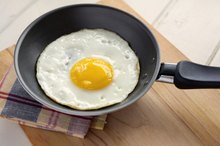The Best Supplements for a Broken Ankle & Torn Ligaments
Injuries, whether to soft tissues or to the bones in the ankle, require certain nutrients to heal quickly and to heal completely. From the outset of ankle injury, the body experiences first the inflammatory phase, complete with swelling and heat, the proliferative phase, where the scar is developing, and finally, the remodeling phase where the tissue regains its strength. During each phase, specific nutrients can enhance the healing process and expedite return to play.
Manage Inflammation with Food Extracts
Inflammation is critical to the healing process as it serves to remove debris around the injury site and to provide an increase in blood flow to the injured ankle. Excess inflammation, however, can delay the healing process. Supplements to support and manage inflammation can help expedite the healing process, says John Berardi, a nutritional biochemist 3. Turmeric extract, garlic extract and bromelain are all plant-based supplements that can lead to marked reduction in inflammation. Incorporate both the whole foot and ample supplementation during the initial stages of injury.
- Inflammation is critical to the healing process as it serves to remove debris around the injury site and to provide an increase in blood flow to the injured ankle.
- Turmeric extract, garlic extract and bromelain are all plant-based supplements that can lead to marked reduction in inflammation.
Manage Inflammation with Fats
Supplements to Help a Piercing Heal
Learn More
The balance of omega-6 and omega-3 fatty acids in the Western diet is skewed heavily toward the omega-6 end, which facilitates inflammation following injury says Dr. Barry Sears, a nutrition researcher and author. Balancing your fatty-acid profile by supplementing with 3 to 9 grams of fish oil capsules each day can help manage inflammation following ankle injury. Likewise, increasing your consumption of olive oil and reducing your consumption of processed foods and canola and soybean oil can help improve inflammation.
Manage Inflammation with Vitamins
Following ankle bone and ligament injuries, there is an increased demand for a number of vitamins to help control inflammation and expedite the healing of damaged tissues. Vitamin A supplementation to the tune of 10,000 IU daily for the first two weeks after injury and vitamin C supplementation of 1 to 2 grams daily can aid in the healing process, says Berardi. Generally speaking, after the first two weeks, vitamin A can be ceased, provided dietary intake is adequate.
Support Healing with Minerals
Pineapple Enzymes for Healing Torn Ligaments and Bones
Learn More
The minerals copper and zinc play a vital role in improving the healing speed of damaged soft tissues. Copper supplementation of 2 to 4 milligrams daily can help improve the production of a soft tissue component called elastin, which strengthens connective tissue. Zinc, a key component in hundreds of the body's enzymes and reactions, taken in a daily dose of 15 to 30mg has been associated with increased rates of healing and stronger soft tissue connections.
- The minerals copper and zinc play a vital role in improving the healing speed of damaged soft tissues.
- Zinc, a key component in hundreds of the body's enzymes and reactions, taken in a daily dose of 15 to 30mg has been associated with increased rates of healing and stronger soft tissue connections.
Support Healing with Amino Acids
Amino acid supplements in a specific blend can help improve healing rates following broken bones and torn ligaments by improving the deposition of collagen, a key structural protein in both bone and ligaments. Berardi suggests two daily dosages of 7g L-glutamine, 7g L-arginine, and 1.5g β-Hydroxy β-methylbutyric acid, known simply as HMB, mixed in water as it has the potential to expedite collagen synthesis and has been associated with improved rates of healing following injury. Berardi suggests continuing supplementation of this blend twice daily for up to three weeks post-injury to give yourself a healing boost.
Related Articles
References
- "Clinical Sports Medicine"; Peter Brukner, M.D., and Karim Khan, M.D.; 2005
- "The Omega Rx Zone: The Miracle of the New High-Dose Fish Oil"; Barry Sears, Ph.D.; 2002
- "Precision Nutrition: Nutritional Strategies for the Management of Sports Injuries"; John Berardi, Ph.D., and Ryan Andrews, M.S., R.D.; 2008
Writer Bio
A writer since 2004, Carson Boddicker has been published in the "Arizona Daily Sun" and on SportsRehabExpert.com, ResearchReview.com and StrengthCoach.com. Currently he is editing his first academic paper on functional movement and injury likelihood. Boddicker is pursuing a double bachelor's degree in medical biology and sports physiology from Northern Arizona University.









